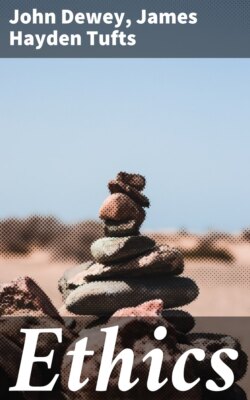Читать книгу Ethics - Джон Дьюи - Страница 16
На сайте Литреса книга снята с продажи.
Оглавление"The land belonged to the clan, and the clan was settled upon the land. A man was thus not a member of the clan, because he lived upon, or even owned, the land; but he lived upon the land, and had interests in it, because he was a member of the clan."[9]
Greek and German customs were quoted at the outset. Among the Celts the laws of ancient Ireland show a transitional stage. "The land of the tribe consisted of two distinct allotments, the 'fechfine' or tribeland, and the 'orta' or inheritance land. This latter belonged as individual property to the men of the chieftain groups."[10] The Hindoo joint-family and the house-community of the Southern Slavonians are present examples of group ownership. They are joint in food, worship, and estate. They have a common home, a common table. Maxims of the Slavs express their appreciation of community life: "The common household waxes rich"; "The more bees in the hive, the heavier it weighs." One difficulty in the English administration of Ireland has been this radical difference between the modern Englishman's individualistic conception of property and the Irishman's more primitive conception of group or clan ownership. Whether rightly or not, the Irish tenant refuses to regard himself as merely a tenant. He considers himself as a member of a family or group which formerly owned the land, and he does not admit the justice, even though he cannot disprove the legality, of an alienation of the group possession. For such a clan or household as we have described is not merely equivalent to the persons who compose it at a given time. Its property belongs to the ancestors and to the posterity as well as to the present possessors; and hence in some groups which admit an individual possession or use during life, no right of devise or inheritance is permitted. The property reverts at death to the whole gens or clan. In other cases a child may inherit, but in default of such an heir the property passes to the common possession. The right to bequeath property to the church was long a point on which civil law and canon law were at variance. The relations of the primitive clan or household group to land were therefore decidedly adapted to keep the individual's good bound up with the good of the group.
2. Movable Goods.—In the case of movable goods, such as tools, weapons, cattle, the practice is not uniform. When the goods are the product of the individual's own skill or prowess they are usually his. Tools, weapons, slaves or women captured, products of some special craft or skill, are thus usually private. But when the group acts as a unit the product is usually shared. The buffalo and salmon and large game were thus for the whole Indian group which hunted or fished together; and in like manner the maize which was tended by the women belonged to the household in common. Slavic and Indian house communities at the present day have a common interest in the household property. Even women and children among some tribes are regarded as the property of the group.
